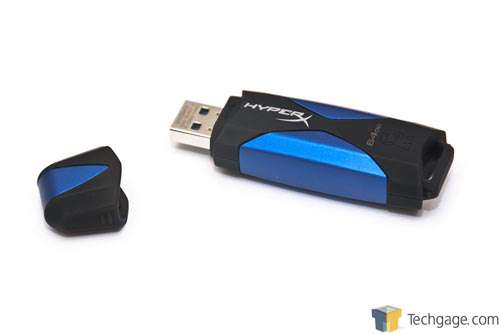- Qualcomm Launches Snapdragon 4 Gen 2 Mobile Platform
- AMD Launches Ryzen PRO 7000 Series Mobile & Desktop Platform
- Intel Launches Sleek Single-Slot Arc Pro A60 Workstation Graphics Card
- NVIDIA Announces Latest Ada Lovelace Additions: GeForce RTX 4060 Ti & RTX 4060
- Maxon Redshift With AMD Radeon GPU Rendering Support Now Available
Kingston DataTraveler HyperX 3.0 64GB Flash Drive Review

On the lookout for a flash drive that not only offers ample storage but also great performance? If so, Kingston’s DT HyperX 3.0 is well worth a look. It’s available in 64GB – 256GB flavors and offers performance of 225MB/s read and 135MB/s write. So let’s take it for a spin and see how it fares to the previously-reviewed DT Ultimate 3.0.
Page 4 – Final Thoughts
On the first page of this article, I mentioned that the Ultimate 3.0 series is better geared for the “regular” consumer, while the HyperX 3.0 is designed for enthusiasts – something Kingston backs up in its press materials. However, as is typical when reviewing products like this, reaching a conclusion about their worth is never clear-cut.
Outside of its internal SSD products, Kingston’s focus has always been more on throughput performance than operations-per-second (IOPS), and for the most part that’s fine. However, the IOPS performance exhibited on this drive can at points cause slowed performance that you just wouldn’t expect on an enthusiast part.
For many, this might not be an issue. It all boils down to what the thumb drive is going to be used for. Are you copying over 10GB movies to bring to a friend’s house? The HyperX 3.0 will be the clear winner thanks to its strong throughput performance. Backing up a folder with thousands of files within? Don’t expect greater than USB 2.0 performance when doing so.
At $150, the HyperX 3.0 64GB costs just about the same as an OCZ Enyo 64GB – a drive that features unparalleled IOPS performance. Though it’s a drive that touts identical specs as the HyperX (225MB/s read, 135MB/s write), we were able to copy over a 4GB folder filled with 4,700 files to it in 48 seconds, whereas it took 188 seconds with the HyperX 3.0.
See where this gets hard to sum up? The Enyo performs better almost always, and costs the same. One thing Kingston does have going in its favor is that the HyperX 3.0 is a small and light drive that can be tossed into a pocket no problem, whereas the Enyo is much larger and requires the carrying around of a cable. The HyperX’s size is likely one of the reasons that Kingston couldn’t squeeze out more IOPS performance, but it’s still a little strange to see ~10 IOPS 4K performance when the drive features 8 channels.
The gist of it all is this. If you’re data transfer needs are simple, in that you aren’t copying over thousands of files to your drive on a regular basis, the HyperX 3.0 is the drive to get. If the opposite is true, the OCZ Enyo (or Kingston’s HyperX Max 3.0, though I haven’t been able to find it for sale) would be a better choice. Convenience also must be taken into consideration, though. While the Enyo is the faster drive overall, it’s not nearly as small and convenient as the HyperX – so if convenience is a key factor in your decision, Kingston wins hands-down.
With the next iteration of this drive, I’d love to see IOPS performance boosted as much as possible even if it meant the throughput was just a bit less. When dealing with huge multi-file transfers, 1GB/s throughput wouldn’t matter if the IOPS was a single-digit value.
Discuss this article in our forums!
Have a comment you wish to make on this article? Recommendations? Criticism? Feel free to head over to our related thread and put your words to our virtual paper! There is no requirement to register in order to respond to these threads, but it sure doesn’t hurt!
Support our efforts! With ad revenue at an all-time low for written websites, we're relying more than ever on reader support to help us continue putting so much effort into this type of content. You can support us by becoming a Patron, or by using our Amazon shopping affiliate links listed through our articles. Thanks for your support!






